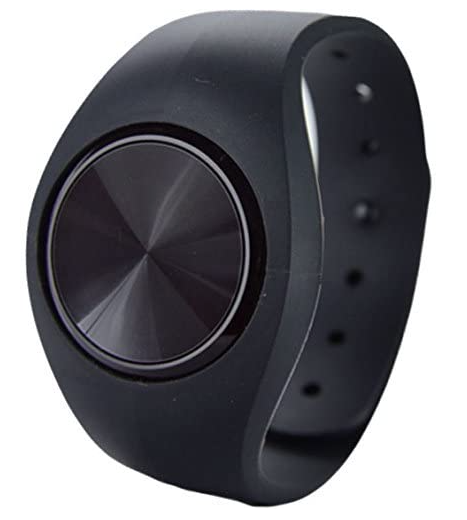
You may have heard of Philips’ Lifeline alerts, whereby someone who falls can press an alert button and 911 and others may be dispatched. This article is the review of an alternative, but not a side by side comparison. I will say that Philips’ Lifeline has been on the market since 2004 and has a range of features and monthly fees from which to choose.
The alternative being reviewed is the V.LERT for $30 (on Amazon) and no monthly fees. The device must be on a wi-fi network.
Essentially, when the person (with memory impairment or not) presses the round black button, a text message is sent to up to 3 people. The button can be worn on the wrist like a watch or as a pendant around the neck (if you supply the necklace). It can also be clipped to a belt, waistband, or another strap (purse, maybe) with purchasing that accessory.
Using the free V.LRT app on a smartphone (iPhone or Android), you are able to customize the text alert message and select up to 3 existing contacts on the smartphone. It does not appear that the person with the button needs to have a smartphone.
When testing this product, my wife did receive the text message. Good so far. 🙂
When it came to testing the auto-fall feature of the V.LRT, I was disappointed. Imagine two unfortunate scenarios. In the first scenario, the person at risk of falling becomes unconscious, either from the impact of the fall or the cause of the fall (e.g., a heart attack). In another, a person with memory impairment is unable to remember explicitly (from some training) or implicitly (from an unconscious habit like riding a bike) to press the black button.
In order to engage the auto-fall alert, where my wife gets a text from a drop of the button, I had to swiftly throw the wrist button onto the sofa. It worked once. I never could get the auto-fall alert to work by a natural drop or in a few cases an actual spill onto a sofa or floor. In case you are wondering, I do my own stunts 😉
There are significant costs to a product like Philips’ Lifeline (and other monitored products and services). However, deciding between a V.LRT and Lifeline is a balance of costs/risks and benefits. If your loved one has little to no memory impairment or risk of becoming unconscious, V.LRT may make sense. If your loved one does have a memory impairment and the auto-fall feature is important, Lifeline does offer that in one of their tiers (though we have not tested).
Please do your research and pray about the decision. Solicit feedback from your care team, including other care partners (if available) and your doctor, nurse, or social worker. It may also help to talk with a trusted friend to get a very objective view.
There are no links in this article. I did purchase the V.LRT from Amazon and then returned it within 30 or so days. That is an idea for you also.
Questions for you to think, write down, and share in the comments section (any or all):
- Do you use an emergency alert system? If so, which one and why?
- If you have research and not bought one yet, what are your thoughts?
- What are your concerns?
Thank you for reading this far and for commenting. Let’s tell hundreds more care partners about this concept by sharing the article. God bless you.
______
Support this ministry and get help at the same time. Visit MyCatholicDoctor.com to schedule a consultation with Matthew, join a Living with Dementia Support Group, or join a Dementia Caregiver Support Group.
If you do not need services but want to help, you can also support us at: https://www.patreon.com/PeaceWithDementia
Join the weekly email newsletter and receive new articles when they are available. Click HERE.



